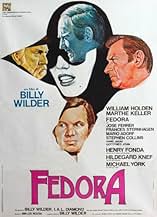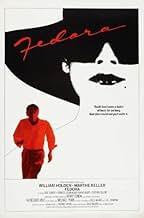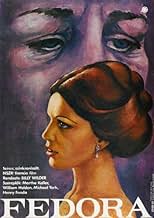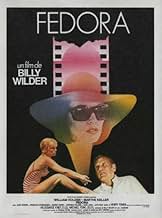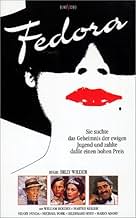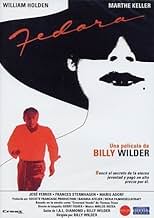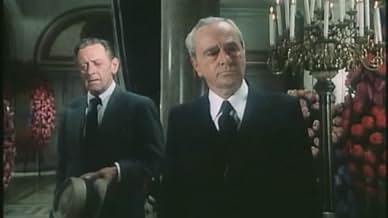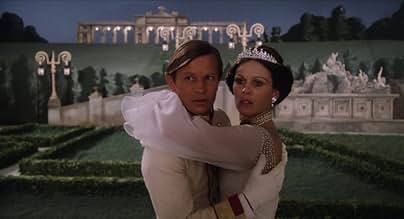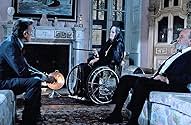AVALIAÇÃO DA IMDb
6,8/10
5,6 mil
SUA AVALIAÇÃO
Barry ''Dutch'' Detweiler, produtor de Hollywood, tenta atrair Fedora.Barry ''Dutch'' Detweiler, produtor de Hollywood, tenta atrair Fedora.Barry ''Dutch'' Detweiler, produtor de Hollywood, tenta atrair Fedora.
- Direção
- Roteiristas
- Artistas
- Prêmios
- 1 vitória e 1 indicação no total
Robert Cunningham
- Assistant Director
- (as Bob Cunningham)
- Direção
- Roteiristas
- Elenco e equipe completos
- Produção, bilheteria e muito mais no IMDbPro
Avaliações em destaque
Billy Wilder's second-last film comes full circle from 1950's Sunset Boulevard.
Fedora begins with a news announcement of the great actress' death. Dutch Detweiler (William Holden) narrates the film, and attends Fedora's lying in state. He recalls what led up to that moment, and the story begins.
Dutch (William Holden) has a script that is perfect for the actress Fedora (Marthe Keller), a Garbo-like myth wrapped in a legend, who lives a reclusive life in Corfu.
One day, he sees her in town and reintroduces himself - they knew each other 30 years earlier. He is astounded by her unchanged beauty. She wears gloves because her doctor can't do anything about aging hands. and she asks him for a few dollars. When he asks if she received his script, she says that they hide the mail from her.
After some spying on Fedora, Dutch comes to the conclusion that she is not being well treated and is imprisoned. Desperate to see her, he tries every way he can to gain entrance to the house, and at one point actually breaks in, only to be knocked out by someone who acts as her chauffeur. When he comes to, he's in his hotel, and a week has passed. And lots has happened.
Fedora is based on the story in Tom Tryon's book, "Crowned Heads," which is three stories - the first about a Lana Turner-type, the second a combination of Clifton Webb and Ramon Navarro, and the third Fedora, actually based on Dietrich, Garbo, and a few other actresses. The first two stories were kind of sleazy. Fedora is really the best one.
I remember this did not get good reviews at the time. Billy Wilder had no end of problems with it. It did not get a full release internationally or nationally; it was not publicized; and it was so badly cut that audiences laughed in all the wrong places when it was shown initially.
It's pathetic to me that a great talent like Billy Wilder was treated so badly by modern Hollywood, but I'm not surprised.
I think this is an interesting story and if Wilder had been allowed to do what he wanted, it would have been a marvelous film. One of the things that brought it down for me was the abominable performance of Marthe Keller. This role brought an end to her brief Hollywood career.
What really bothered me was all the dubbing. Neither Knef's nor Keller's voices were used, and it's obvious. The actresses just sound dubbed with very little effort at performances. I may be overly sensitive; that dubbing sound is a big turnoff for me, but maybe not for others.
I think this plays better on television than it probably did in the theaters, and it's definitely worth seeing for Holden at least, who is Joe Gillis had he lived.
A series of unfortunate events spoiled what this film could have been, but it's still Billy Wilder, it's still William Holden, and you can't go too wrong.
Fedora begins with a news announcement of the great actress' death. Dutch Detweiler (William Holden) narrates the film, and attends Fedora's lying in state. He recalls what led up to that moment, and the story begins.
Dutch (William Holden) has a script that is perfect for the actress Fedora (Marthe Keller), a Garbo-like myth wrapped in a legend, who lives a reclusive life in Corfu.
One day, he sees her in town and reintroduces himself - they knew each other 30 years earlier. He is astounded by her unchanged beauty. She wears gloves because her doctor can't do anything about aging hands. and she asks him for a few dollars. When he asks if she received his script, she says that they hide the mail from her.
After some spying on Fedora, Dutch comes to the conclusion that she is not being well treated and is imprisoned. Desperate to see her, he tries every way he can to gain entrance to the house, and at one point actually breaks in, only to be knocked out by someone who acts as her chauffeur. When he comes to, he's in his hotel, and a week has passed. And lots has happened.
Fedora is based on the story in Tom Tryon's book, "Crowned Heads," which is three stories - the first about a Lana Turner-type, the second a combination of Clifton Webb and Ramon Navarro, and the third Fedora, actually based on Dietrich, Garbo, and a few other actresses. The first two stories were kind of sleazy. Fedora is really the best one.
I remember this did not get good reviews at the time. Billy Wilder had no end of problems with it. It did not get a full release internationally or nationally; it was not publicized; and it was so badly cut that audiences laughed in all the wrong places when it was shown initially.
It's pathetic to me that a great talent like Billy Wilder was treated so badly by modern Hollywood, but I'm not surprised.
I think this is an interesting story and if Wilder had been allowed to do what he wanted, it would have been a marvelous film. One of the things that brought it down for me was the abominable performance of Marthe Keller. This role brought an end to her brief Hollywood career.
What really bothered me was all the dubbing. Neither Knef's nor Keller's voices were used, and it's obvious. The actresses just sound dubbed with very little effort at performances. I may be overly sensitive; that dubbing sound is a big turnoff for me, but maybe not for others.
I think this plays better on television than it probably did in the theaters, and it's definitely worth seeing for Holden at least, who is Joe Gillis had he lived.
A series of unfortunate events spoiled what this film could have been, but it's still Billy Wilder, it's still William Holden, and you can't go too wrong.
Billy Wilder revisits the territory of his Hollywood Babylon classic Sunset Boulevard, with the same male lead (William Holden) in an almost identical role as a washed-up screenwriter trying to get to a reclusive and mysteriously ageless one-time screen queen in order to pitch her a comeback script. Story elements include Oscar Wilde's Picture of Dorian Gray and (off-screen) the many mad-doctor yarns of the 1930s and 1940s in which Boris Karloff messes about with Things We Were Never Meant To Know. Looks great in a brittle and glitzy 1970s way, as befits its scornfully depicted international-rich-white-trash milieu. Essentially it's a sombre but humanistic sermon on the hopeless worship of physical youth and beauty: as a medieval English writer put it, "who sows hope in the flesh reaps bones". A very relevant film for our narcissistic times, its only big flaw is that it's a mighty chilly piece of work, easier to admire than to love.
A shamefully overlooked movie , it is Wilder's testament with a lot of attractive ingredients as brooding drama , thrills , sensitive theme , amazing twist finale, in a word , emotion . It deals with a washed-out producer : William Holden who attempts to hire an old star called Fedora : Marthe Keller , she is nowadays retired and living at a mansion in Corfu along with a cripple countess : Hildegard Knef , their assistant : Frances Sternhagen and a mysterious doctor : Jose Ferrer.
Dramatic and witty film about cinema world containing realism, illusion, a twisted love story and tragedy . A flashy film and cynical at times , compellingly made by the great maestro Billy Wilder , at his last feature along with Buddy Buddy, but Fedora only superficially does it resemble Sunset Blvd . Colorfully set on Corfu , including nice cinematography by George Fisher , but a perfect remastering being really necessary . It explores deeply the basis of the cinema by thought-provoking and deranged portrayals of tarnished stars and the disastrous attempts to make time stop , providing a narrative assurance beyond the grasp of most filmmakers today.
Accompanying by a sensitive and stirring musical score by classy composer Miklos Rozsa . This moving motion picture was stunningly directed by the great Billy Wilder , giving one of the most sublime achievements of the Seventies , though it failed at the international boxoffice . Wilder was one of the best Hollywood directors who made various masterpieces and with special penchant for comedy , such as : The Major and the Minor , The Seven Year Itch , Sabrina , Some Like Hot The Apartment , One Two Three , Irma La Douce , Kiss Me Stupid , The Fortune Cookie , Avanti , The Front Page . Although Wilder also made Film Noir and Dramas, such as : The Lost Weekend , Double Indemnity , Five Graves to Cairo , A Foreign Affair , Ace in the Hole , Stalag 17 , The Spirit of St Louis , Witness for the Prosecution , Fedora , among others .
Dramatic and witty film about cinema world containing realism, illusion, a twisted love story and tragedy . A flashy film and cynical at times , compellingly made by the great maestro Billy Wilder , at his last feature along with Buddy Buddy, but Fedora only superficially does it resemble Sunset Blvd . Colorfully set on Corfu , including nice cinematography by George Fisher , but a perfect remastering being really necessary . It explores deeply the basis of the cinema by thought-provoking and deranged portrayals of tarnished stars and the disastrous attempts to make time stop , providing a narrative assurance beyond the grasp of most filmmakers today.
Accompanying by a sensitive and stirring musical score by classy composer Miklos Rozsa . This moving motion picture was stunningly directed by the great Billy Wilder , giving one of the most sublime achievements of the Seventies , though it failed at the international boxoffice . Wilder was one of the best Hollywood directors who made various masterpieces and with special penchant for comedy , such as : The Major and the Minor , The Seven Year Itch , Sabrina , Some Like Hot The Apartment , One Two Three , Irma La Douce , Kiss Me Stupid , The Fortune Cookie , Avanti , The Front Page . Although Wilder also made Film Noir and Dramas, such as : The Lost Weekend , Double Indemnity , Five Graves to Cairo , A Foreign Affair , Ace in the Hole , Stalag 17 , The Spirit of St Louis , Witness for the Prosecution , Fedora , among others .
"Fedora" was made with German and French money.It speaks volumes about what America thought of the commercial potential of one of its greatest directors.
As "Buddy Buddy" ,remake of a FRench comedy does not count ,"Fedora" is Wilder's last opus.And it is a good film,nay a splendid one regarded in context,the best last movie Wilder could make ,which is just as well ,because when epitaphs are seen as worthless,the things that came before can sometimes been retropectively tarnished by association."Fedora" stands in little danger to bring this about.It is a last film ,soon,like the others ,to yellow with age but never lose its poignancy.
Some said it was a poor man's "Sunset Blvd" .There are similarities: flashbacks,real-life actors (Cecil B.De Mille in "Sunset" Henry Fonda and Michael York" in "Fedora" ) and the terror of getting old ,the longing for eternity.There the comparison ends.
For "Fedora" was ,in 1978,a "modern" film which the European (notably the FRench critic) hailed as a young man's work."Fedora" is absorbing from start to finish:it is ,in turn,a romantic story (the affair with York) an investigation à la "Citizen Kane" ,a thriller and even a Gothic horror movie.William Holden,Hildegarde Knef , Swiss Marthe Keller,Mario Adorf and Jose Ferrer are all excellent.
The first scene when the heroine throws herself under the train recalls the techniques of the forties/fifties .Whereas "Fedora " is a thoroughly modern film,it manages to display nostalgia for the things we lost when the cinema began to lose its innocence or became intellectual or "got small!"The same nostalgia we felt in "Avanti" .The luminous blue Mediterranean sky is in direct contrast to the darkness of Wilder's earlier films noirs.
With "Fedora" Wilder came out blaring!
As "Buddy Buddy" ,remake of a FRench comedy does not count ,"Fedora" is Wilder's last opus.And it is a good film,nay a splendid one regarded in context,the best last movie Wilder could make ,which is just as well ,because when epitaphs are seen as worthless,the things that came before can sometimes been retropectively tarnished by association."Fedora" stands in little danger to bring this about.It is a last film ,soon,like the others ,to yellow with age but never lose its poignancy.
Some said it was a poor man's "Sunset Blvd" .There are similarities: flashbacks,real-life actors (Cecil B.De Mille in "Sunset" Henry Fonda and Michael York" in "Fedora" ) and the terror of getting old ,the longing for eternity.There the comparison ends.
For "Fedora" was ,in 1978,a "modern" film which the European (notably the FRench critic) hailed as a young man's work."Fedora" is absorbing from start to finish:it is ,in turn,a romantic story (the affair with York) an investigation à la "Citizen Kane" ,a thriller and even a Gothic horror movie.William Holden,Hildegarde Knef , Swiss Marthe Keller,Mario Adorf and Jose Ferrer are all excellent.
The first scene when the heroine throws herself under the train recalls the techniques of the forties/fifties .Whereas "Fedora " is a thoroughly modern film,it manages to display nostalgia for the things we lost when the cinema began to lose its innocence or became intellectual or "got small!"The same nostalgia we felt in "Avanti" .The luminous blue Mediterranean sky is in direct contrast to the darkness of Wilder's earlier films noirs.
With "Fedora" Wilder came out blaring!
I wish to defend Fedora somewhat from the sole previous IMDB reviewer. It is not a great movie such as "Sunset Boulevard" but it is hugely enjoyable and a real treat for anyone interested in old Hollywood, and the bitter-sweet quality of fading glamour.
Since the death of Marlene Dietrich, and especially with the publication of a biography by her daughter Maria Riva, it is now clear that Fedora is a direct portrait of Ms. Dietrich with much telling accurate detail.
Billy Wilder knew Dietrich and old Hollywood well, and even though made in the 70's, the film captures a genuine essence probably for the last time as figures from the golden age of film have since then moved into retirement and sadly largely slipped the mortal coil.
The real story of the EXTRAORDINARY Ms. Dietrich is better than any of her movies, and Fedora tells some of that story. It makes for more comfortable viewing than Maximillian Schell's documentary "Marlene".
Wilder is an intelligent director, which makes "Fedora" worthwhile viewing. I have always found "Sunset Boulevard" a little too arch and self-consciously aware; "Fedora" is a more lyrical piece by the director as an older man.
Since the death of Marlene Dietrich, and especially with the publication of a biography by her daughter Maria Riva, it is now clear that Fedora is a direct portrait of Ms. Dietrich with much telling accurate detail.
Billy Wilder knew Dietrich and old Hollywood well, and even though made in the 70's, the film captures a genuine essence probably for the last time as figures from the golden age of film have since then moved into retirement and sadly largely slipped the mortal coil.
The real story of the EXTRAORDINARY Ms. Dietrich is better than any of her movies, and Fedora tells some of that story. It makes for more comfortable viewing than Maximillian Schell's documentary "Marlene".
Wilder is an intelligent director, which makes "Fedora" worthwhile viewing. I have always found "Sunset Boulevard" a little too arch and self-consciously aware; "Fedora" is a more lyrical piece by the director as an older man.
Você sabia?
- CuriosidadesPrior to a preview in Santa Barbara, United Artists had cut twelve minutes from the movie. Director Billy Wilder refused to allow any further cuts, and the screening went poorly, with the audience laughing during the wrong parts of the film.
- Erros de gravaçãoIn the opening scene set in France in 1977, a woman throws herself in the path of a steam train. The last steam locomotives on mainline French railways were withdrawn in 1974, so this could not have happened as shown.
- Citações
The Countess: Remember those days? Moral turpitude? You could have six husbands but you couldn't have an illegitimate child. Now you can have six children and no husband and who cares.
- ConexõesFeatured in Arbeiten mit Billy Wilder: Ein Gespräch mit Mario Adorf (2014)
Principais escolhas
Faça login para avaliar e ver a lista de recomendações personalizadas
- How long is Fedora?Fornecido pela Alexa
Detalhes
- Data de lançamento
- Países de origem
- Idiomas
- Também conhecido como
- Федора
- Locações de filme
- Madouri Island, Lefkada, Grécia(Fedora's private island)
- Empresas de produção
- Consulte mais créditos da empresa na IMDbPro
Bilheteria
- Orçamento
- US$ 6.727.000 (estimativa)
- Tempo de duração1 hora 56 minutos
- Mixagem de som
- Proporção
- 1.85 : 1
Contribua para esta página
Sugerir uma alteração ou adicionar conteúdo ausente



